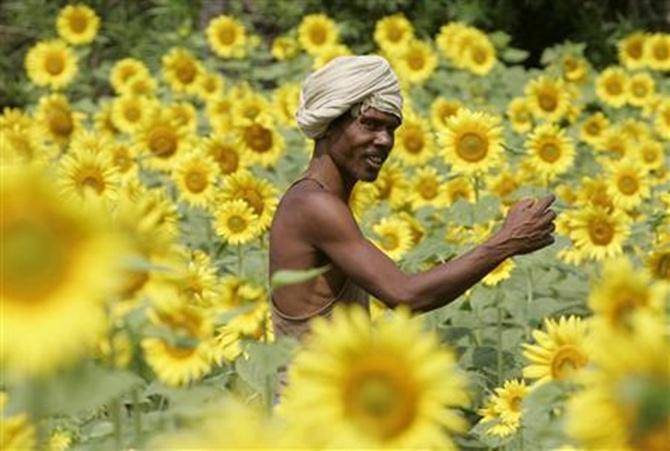A transparent and scientific way of computing farm losses and a time-bound compensation mechanism can make farmers feel more confident and discourage them from treading the suicidal path, notes Charan Singh & C L Dadhich.
 In recent months, there have been persistent instances of farmer suicides in India, and with the impeding El Nino impacting the agriculture sector, the situation could become worse.
In recent months, there have been persistent instances of farmer suicides in India, and with the impeding El Nino impacting the agriculture sector, the situation could become worse.
However, in view of the climatic changes and global warming, instances of financial distress in rural areas are expected to increase in future.
In situations of financial distress, the farmer is uncertain of the compensation that he would receive and is generally under psychological pressure, despite having established regulatory financial institutions that specialise in the assessment and mitigation of risks.
This distress can be addressed by transparently standardising the procedure for computing compensation and automating the process.
In view of the fact that nearly 60 per cent of the population or about 700 million people live in rural areas, such natural calamities directly impact the economic life of citizens.
Political institutions do provide some assistance to address the economic woes of people suffering from crop damage but get embroiled in constant political debates trivialising the issue.
The insurance company also plays a role but generally, the compensation is delayed for various reasons.
The role of a farming lobby is significant and the pressure bought upon the government results in compensation from the Budget, implying that the taxpayers - including the farmers - ultimately pay for the impact of natural calamities.
Commercial banks are also expected to be soft on loan repayments and restructure the loans, if not write them off.
The Reserve Bank of India (RBI) also considers some interest rate concessions that, in turn, could disrupt the functioning of monetary policy. Thus, the economy regularly suffers because of natural calamities, which should normally be taken care of by a robust crop insurance mechanism in the country.
It would be useful to have a scientific basis of computing losses on account of natural calamities in the country, especially when they occur so frequently.
To have a scientific and transparent formula for computing losses, the government could consider establishing a State Standing Committee (SSC), consisting of an official from the respective state government, the National Bank for Agriculture and Rural Development (Nabard), the insurance company, and an academician from the agriculture university affiliated to the state.
The losses can be estimated not only based on the information received from the district and village officials but also by using technological advancements such as satellite imagery of the crop area.
The details of the damage as well as the report by the SSC fixing the compensation should be made available on the website of the state and Union government within two weeks of any incident.
This would ensure a transparent and scientific calculation of the losses that have been incurred by the farmer and readily known to the taxpayer.
This data can then be used as an input for the commercial banks and the RBI as well as the political authority to disburse any concessions to the affected farmers. The compensation could be directly paid through the farmer's bank account, thanks to the Jan Dhan Yojana.
In addition, for any damage caused to the infrastructure in the region because of a natural calamity as well as for miscellaneous losses, some component of the compensation should also be extended to the gram panchayats.
There is also a need for monitoring the developments in rural spaces, as a number of financial instruments are being introduced because of initiatives on account of financial inclusion of the Union government, such as the Jan Dhan Yojana and social security schemes such as old-age pension and accident insurance.
Dairy farming is also expected to be modernised, and so is the use of solar energy and biogas. In view of modern technology reaching rural areas through optical fibre, increasing penetration of equity market terminals can also be expected.
Thus, rural areas would benefit from easy availability of diversified financial instruments.
The vulnerable farmer, on hope of standing crop, generally tends to borrow more and then suffer from financial stress. Therefore, in the current context, Nabard - with presence in every district - is most suited to supervise the growth of financial instruments in the rural sector.
It is a matter of distress for professional bankers and policymakers in the agriculture sector that in modern India, farmers have to commit suicide because of financial market imperfections.
The transparent and scientific basis of computing farm losses and a time-bound, near-automatic mechanism of compensation would hopefully provide confidence to farmers and discourage them from treading the suicidal path.
Further, the regular monitoring of financial development by a professional body such as Nabard can also help in a focused approach to dispel fears of distress in the minds of vulnerable farmers.
Charan Singh is RBI Chair Professor of Economics, IIM-Bangalore. C L Dadhich is Secretary and Treasurer of Indian Society of Agricultural Economics and former director of Rural Economics, RBI.











